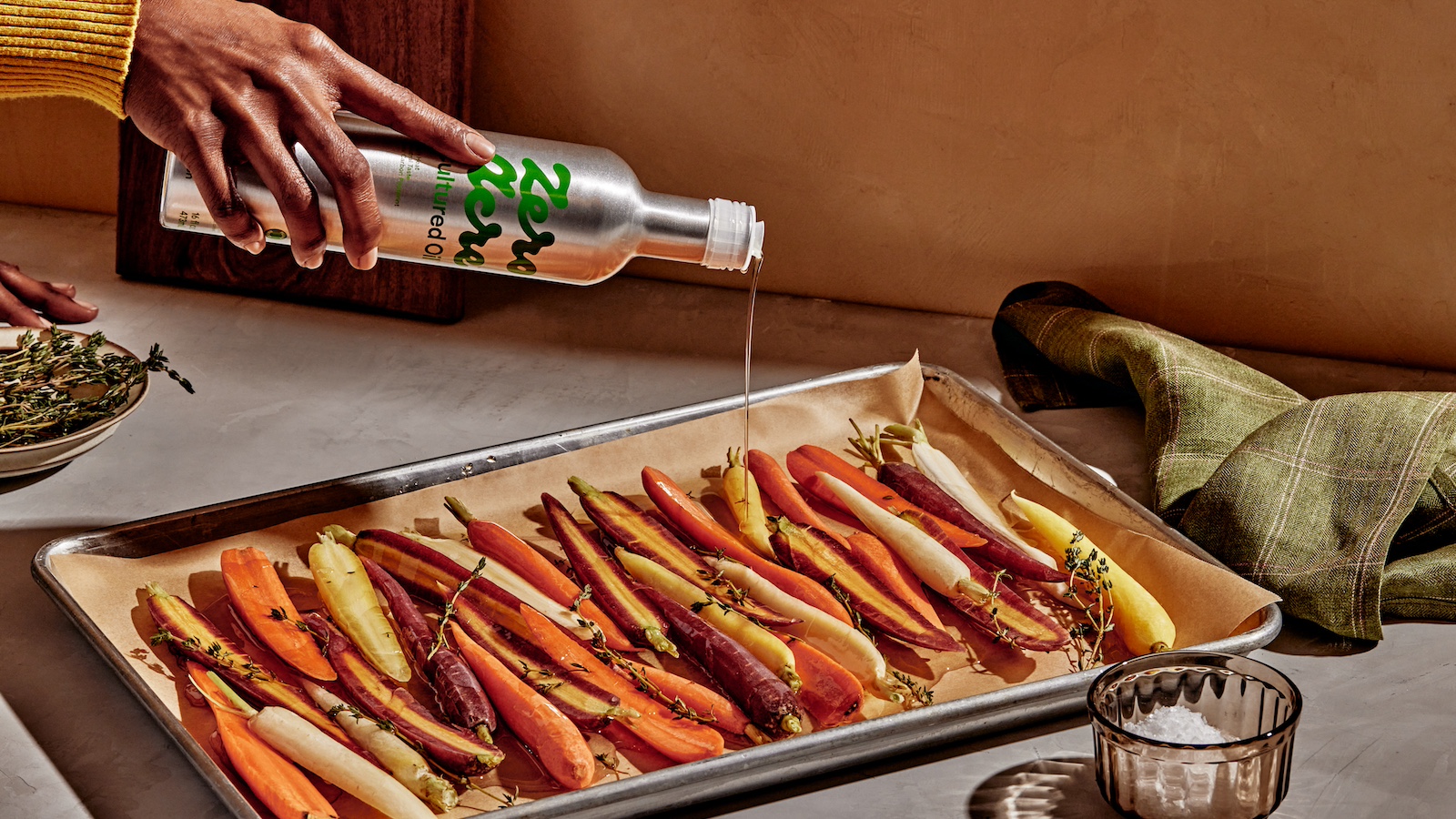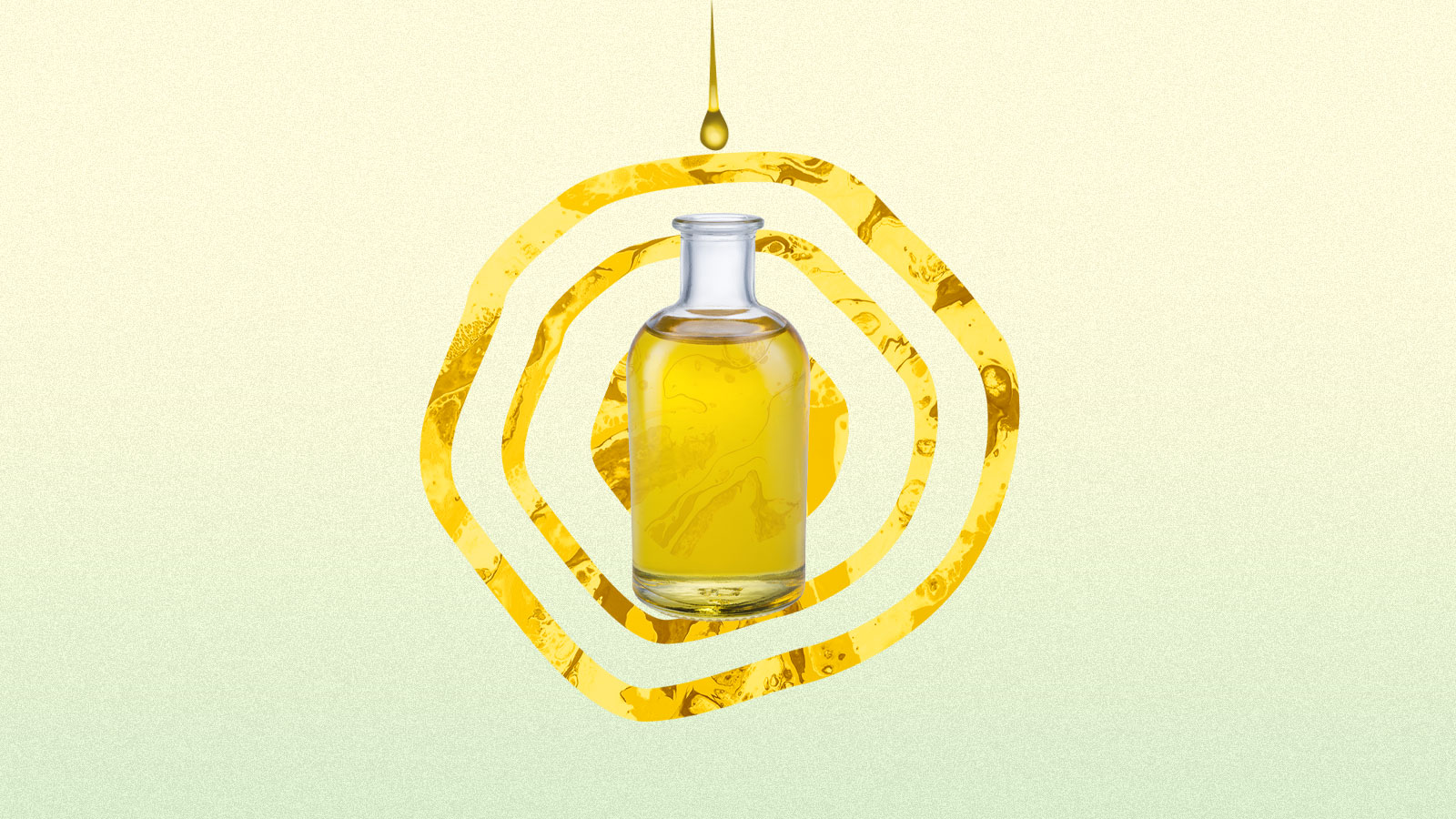First there was lard. For at least 200 years, a great many Americans fried their potatoes in pork fat. Then, early last century, came the invention of Crisco, a lard look-alike made from cottonseed oil. Procter & Gamble advertised it as healthier — more digestible — than pig grease. The marketing campaign worked. Crisco took off.
Its success gave birth to a new era of cooking fats. Americans today consume a long, golden stream of vegetable oils: soybean, palm, safflower, sunflower, peanut, avocado, coconut, canola, olive. The plants cultivated to make these oils now cover nearly a quarter of the planet’s cropland, and demand for them is still growing. That’s not good news for the Earth. To grow oil crops, particularly palm and soybeans, farming corporations are cutting down carbon-rich forests, threatening climate goals and biodiversity.
But what if there was a cooking oil that didn’t drive deforestation? A California startup called Zero Acre Farms claims to have created just that. Zero Acre hopes its product, called Cultured Oil because it’s made by fermenting sugarcane, will shift American diets like Crisco did, but to a different end. The company says its oil requires 90 percent less land and accounts for 86 percent fewer greenhouse gas emissions than soybean oil, the most widely consumed vegetable oil in the United States.
“If we’re going to continue to satisfy our insatiable desire for oils and fats,” said Stephen del Cardayre, Zero Acre’s co-founder and chief technical officer, “we have to do it more efficiently.”

The startup’s new cooking oil is starting to gain attention. Zero Acre has raised millions of dollars from venture capital funds linked to Chipotle Mexican Grill, Richard Branson’s Virgin Group, and the actor Robert Downey Jr. In September, Shake Shack announced it would test Cultured Oil on its fries at two of its New York City restaurants. Grocery stores aren’t selling sleek stainless steel bottles of the oil yet, but you can buy one on Zero Acre’s website for $26.99.
Cultured Oil, which has a soft yellow hue like other oils, is made by microorganisms. Add sugarcane to a vat filled with algae, and the microscopic beings convert the sugar into oil. The result, according to Zero Acre, is a liquid that’s healthier than its counterparts because it’s low in saturated and polyunsaturated fats, the sort that have given seed oils a bad (if possibly undeserved) rap for contributing to chronic inflammation and heart disease.
This probably isn’t the first time you’ve encountered a lab creation that’s advertised with a list of impressive stats about how it will save the planet. Climate-conscious eaters have been under a barrage of new choices stemming from the proliferation of products aimed at replacing cow milk, beef, and other carbon-intensive meats. Whether it’s oat milk, plant-based burgers, or lab-grown chicken, the food sector is awash with claims of sustainability, some of which don’t hold up under scrutiny. Maybe you’ve made up your mind to eat a Beyond Burger instead of a beef one, and now you’re wondering whether to sear the novel meat in novel oil.
Grist spoke with three independent experts about how to assess green claims about new food products like Zero Acre’s oil. Each stressed that the only way is to look at something called a life cycle assessment, nicknamed LCA — the analysis that a company uses to determine the land, energy, and water use associated with its product and to compare it to other products.
“Without the LCA, I can’t make anything of it,” said Sarah Collier, an assistant professor and food sustainability researcher at the University of Washington.
The mere fact that a life cycle assessment has been done, even by a third party (as in the case of Zero Acre), isn’t enough to inspire confidence, experts said. That’s because these analyses can be built in a way that makes a company’s product look better than its competitors’. There are a variety of ways to grow oil crops, and different growing systems use different amounts of land and emit different amounts of greenhouse gases. In the case of Cultured Oil, the kinds of soybean farms or palm plantations that you compare against the sugarcane operations that feed Zero Acre’s microbes could lead to different conclusions.
“If you choose baselines that aren’t really equivalent, you can end up making your practice look really, really good, and you can also end up making a competitor’s practice or a legacy practice very bad,” said Mark Bomford, director of the Yale Sustainable Food Program. “If I wanted to make soy-based land look really bad, I would include the largest estimates around the worst kinds of deforestation.”
Like many companies, Zero Acre has not made its assessment public, so it’s not possible to verify independently how the boundaries of the analysis were drawn. But a spokesperson for the company did say that its comparison with soybean oil relies on data from soybean production in South America, the same region where the sugarcane used to make Zero Acre oil is grown. Del Cardayre told Grist that Zero Acre plans to publicly release its results once the company is bigger and more stable but is keeping the assessment private for now because it contains proprietary information.
“We try to be as transparent as we can,” del Cardayre said. “Our whole goal, the reason we were founded, was to make better oils and fats that were better for the planet, for the body, and for food. It’s what drives us. It’s our North Star. We have no interest in doing something that’s not doing that.”
Independent experts agreed that Zero Acre’s oil holds promise. Joseph Poore, a food sustainability researcher at the University of Oxford, said in an email that the company’s goal to minimize environmental damage and improve human health is “excellent and critical.” Vegetable oil production is a major source of greenhouse gas emissions, and rising demand for oil crops like palm has been linked to habitat destruction and biodiversity loss. But Poore and other academics also said that it’s too early to know how much better for the environment Cultured Oil will be.
“A lot of academics are going to be skeptical because we’ve heard it before,” said Julie Guthman, a professor of social sciences who studies food systems at the University of California, Santa Cruz.
Two years ago, Guthman co-authored a paper that investigated claims of “dematerialization” in the alternative proteins industry — referring to the idea, pushed by Silicon Valley startups, that edible protein can be made “from (nearly) nothing, drawing on abundant or mundane resources” that presumably have no environmental drawbacks.
In the paper, Guthman and her colleague Charlotte Biltekoff found that the details of how these foods get produced “are largely black-boxed, making any claims to dematerialization appear as magic.” Food-tech companies aren’t necessarily trying to keep consumers in the dark, but they feel pressure, in their quests to woo investors and reshape the world, not to divulge trade secrets. The way they represent their products, Guthman and Biltekoff wrote, obfuscates more than it reveals and makes it “difficult, if not impossible, for the public — or anyone really — to meaningfully assess the promises and their potential consequences.”



